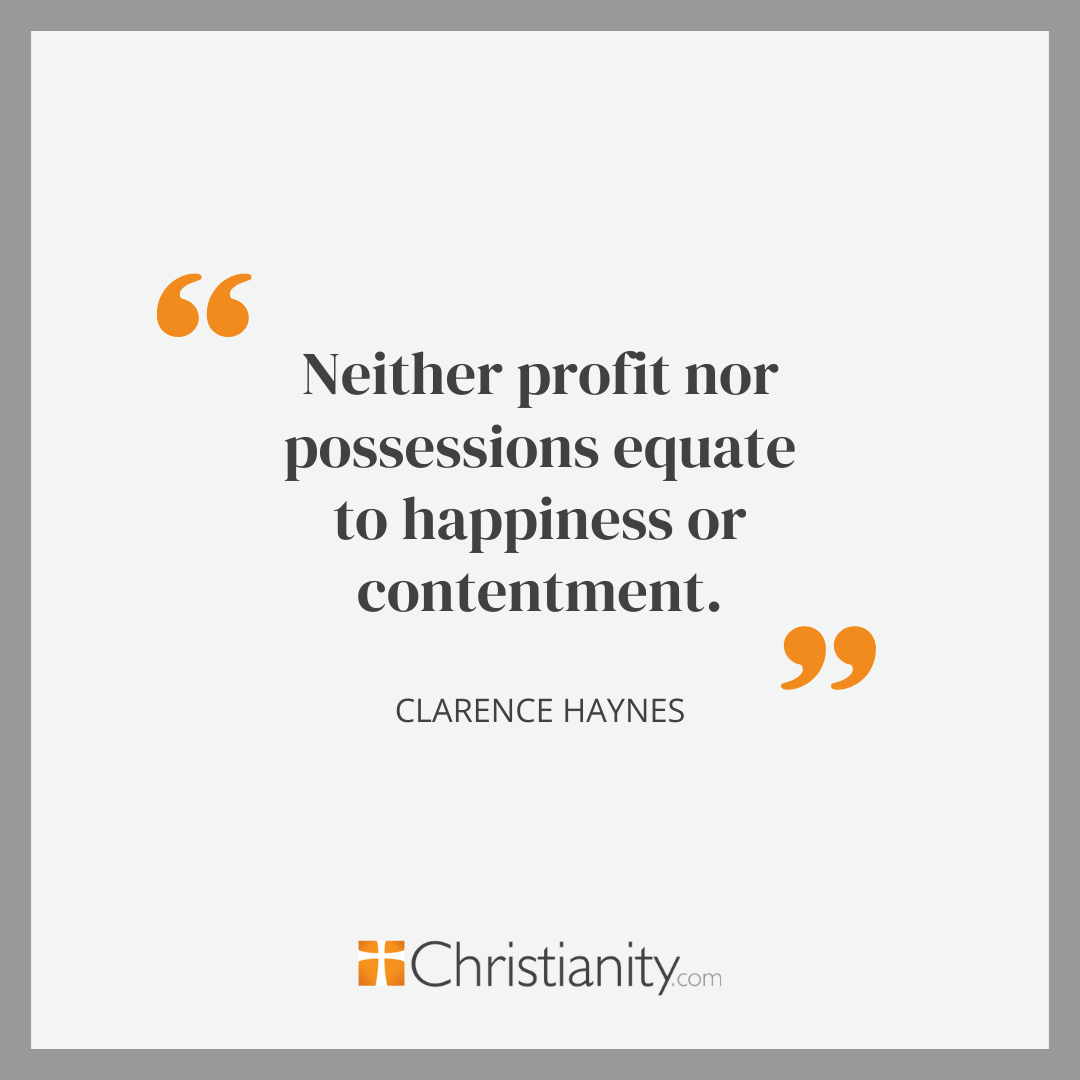The Quiet Cost of Impulse and Learning to Buy with Intention
Finances


Audio By Carbonatix
By Clarence L. Haynes Jr., Crosswalk.com
Before the internet, we were already trained to be impulse buyers. If you have ever been in a supermarket, you probably noticed that they put all the candies and “goodies” right by the checkout counter. The hope is that when you check out, you grab that little something extra. You didn’t walk into the store with that item on your mind or on your list, but you saw it, and something inside you said I want it. When this happens, the marketers and sales psychologists win.
In years past, you had to be physically present for that to happen, but not anymore. Impulse enticements are everywhere. Most websites today will even run ads based on your Google search history, tempting you to click on that “thing” that you believe you need. Because this is so in your face, it becomes much more difficult to resist. To make it even easier, many times all you need is a one-click checkout, which means you can feed that impulse immediately without having to give it much thought.
With endless ads and one-click checkouts, impulse buying has become part of daily life. Studies show that many purchases are driven by stress, loneliness, or the brief comfort of control. Yet, the satisfaction fades quickly, often leaving behind regret, clutter, and, many times, a mountain of debt. Experts encourage mindful habits—pausing before buying, waiting 24 hours, or asking if the item truly adds joy or peace. Even with those recommendations, it is hard to fight the marketing machine designed to influence and drive human behavior.
What Scripture Says about Our Consumer Culture
America is a consumer-driven economy. Consumer spending accounts for roughly 70% of our nation's GDP. Allow me to translate what that means. The economic health of our nation largely (probably too large) depends on how much money you, the consumer, spend. This makes our economy vulnerable should consumers decide to pull back on spending. That’s why spending can reflect how the overall economy is doing.
We have an economy that tells you to spend more, coupled with a culture that encourages you to need more. Profit motivates one, and happiness motivates the other. This is a Catch-22 if there ever was one.
There is one reality missing from this equation: neither profit nor possessions equate to happiness or contentment. Often, it is quite the opposite. Listen to the words of Solomon.
"Whoever loves money never has enough. Whoever loves wealth is never satisfied with their income. This too is meaningless. As goods increase, so do those who consume them. And what benefit are they to the owners except to feast their eyes on them?" - (Ecc. 5:10-11)
This scripture reminds us to view our possessions and the pursuit of them from the right perspective. In a world that whispers “you need more,” how can we slow down, breathe, and remember that peace isn’t found in what we buy—but in resting with the One who gives us all we truly need?

Unmasking the Idols Behind Impulse Buying
The Idol of Comfort
Is impulse buying just a bad habit, or is it a symptom of something deeper? For many, it results from trying to fill what feels like an unmet need. You might experience stress, anxiety, or just be having a down day, and the purchase gives you an immediate high that temporarily hides what is happening underneath.
If you are buying because it is something you want or have been considering for a while, then that’s okay as long as you can afford it. However, if the purchase is to make yourself feel better or valuable, then it will not last. The frustrating aspect of it is that once the euphoria of the purchase wears off, because your situation may not have changed, you may often feel worse off than before. That’s why it is crucial that you find your comfort and security in Christ and nowhere else. Everything else is sinking sand that makes big promises but delivers small results.
The Idol of Identity
Another idol to be careful of is the idol of identity. It is so easy to get wrapped up in “brand” names as if they say something important about you. They don’t. This influence affects people, causing them to identify themselves by the things they own. It can dictate the type of car you drive or the clothes you wear. It’s as if we use the item as a status symbol. I will use a sentence I use often when I do financial education seminars. Just because you can, does not mean you should. Even if you can afford it, if you use that as the basis of your identity, then you also are on sinking sand. Can a new car, new clothes, or a new piece of jewelry make you feel good in the moment? Yes, it can. However, that is not who you are; those are just the things you possess. Then he said to them,
“Watch out! Be on your guard against all kinds of greed; life does not consist in an abundance of possessions.” - Luke 12:15
The Idol of Covetousness
There is an old expression called “keeping up with the Joneses” (I’m still not sure which Jones they are talking about). Anyway, sometimes we experience the pressure to do something because someone else does. It’s not enough to be happy for what someone has obtained; you have to either match it or outdo it. This is what it means to covet. When covetousness fills your heart, that means contentment is absent. This is not God’s plan.
Covetousness drives a cycle of comparison that does not enhance but robs you of the enjoyment you seek from the things you get. That’s why the Bible warns against this trap. Don’t covet anything that belongs to your neighbor because when you do, it reflects your heart.
Learning to Buy with Intention
So, how do we break free from the cycle of impulse buying and cultivate intentional buying? First, let me say that not all impulse buying is bad. To discern between good and bad, you must simply ask why you are buying. That answer will determine the motive and whether you should or shouldn’t do it.
Beyond that, here are a few practical steps to help you on this journey.
Allow Yourself a Splurge Budget
It makes sense to have money set aside that you can spend on non-essential items, which can include impulse items. If you work hard, there is nothing wrong with rewarding yourself, as long as you are not masking some underlying issue. You cannot eliminate every impulse purchase, but you can address impulsive motives that identify if this is something you should do.
Remove the Temptations
The best way to avoid giving in to your impulses is to remove the temptations that feed them. If you are trying to stop eating donuts, don’t walk by the donut shop. While that works with some things, this challenge is more difficult because we encounter so many ads, especially on our phones and computers. If you have purchasing apps on your phone or you are always peeking online to see what is available, you are setting yourself up for an impulse buy. This means you may have to delete the app on your phone or stop going to those websites.
Cultivate Gratitude
The last suggestion to buy with intention is to always be thankful for what you already have. The Psalms tell us repeatedly not to forget the things God has done. When you shift your focus to all that God has blessed you with, your attitude can move from one of lack to one of abundance. When you have everything you truly need, it reduces the urge to acquire more.
The Joy of True Contentment
Ultimately, the cure for impulse buying lies in contentment, which can only come from a heart that believes God is enough. Contentment isn’t about having or getting everything you want. It’s about trusting God to provide everything you need.
Perhaps the most satisfying place in life is knowing your worth and value have nothing to do with anything you have but who you are in Christ. When you find fulfillment in him, then your possessions become tools he can use because they are not the source of your joy. This will not only limit your impulse buying but will also make you a better steward of the resources God has given you.
Photo Credit: ©Unsplash/Luca Laurence
 Clarence L. Haynes Jr. is a dynamic speaker, Bible teacher, and co-founder of The Bible Study Club, dedicated to helping people live with purpose and clarity. In addition to his ministry work, Clarence has spent the last 13 years as a trusted financial educator, guiding thousands of people across the country—including employees at many Fortune 500 companies—toward lasting financial wellness. His unique ability to blend practical wisdom with spiritual insight equips people to thrive in every area of life.
Clarence L. Haynes Jr. is a dynamic speaker, Bible teacher, and co-founder of The Bible Study Club, dedicated to helping people live with purpose and clarity. In addition to his ministry work, Clarence has spent the last 13 years as a trusted financial educator, guiding thousands of people across the country—including employees at many Fortune 500 companies—toward lasting financial wellness. His unique ability to blend practical wisdom with spiritual insight equips people to thrive in every area of life.
He is the author of The Pursuit of Purpose, which helps readers understand how God leads them into his will, and the author of The Pursuit of Victory: How To Conquer Your Greatest Challenges and Win In Your Christian Life. Clarence is also committed to helping 10,000 people learn how to study the Bible and has released his first course, Bible Study Basics, to achieve that goal. To learn more about his ministry and resources, please visit clarencehaynes.com.

